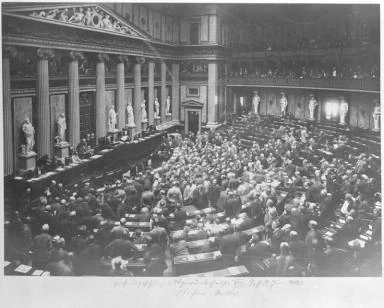Imperial Council of Austria(German: Reichsrat) is the Parliament of the Austrian Empire. It is a Bicameral legislature, concisting of the Herrenhaus(House of Lords) and the Abgeordnetenhaus(House of Representatives). Its meeting take place in the Austrian Parliament building on the Ringstraße in Vienna.

Austrian Parliament Building at Ringstraße in Vienna.
History[]
The Imperial Council has firstly been created in 1868 after the transition to Constutitional Monarchy in the Austrian Empire which has happened due to a referendum announced by Emperor Eduard. However, in 1870 the Austrian Empire was defeated in the Austro-Prussian war of 1870 where Austria sided with France against Prussia and Italy. Due to this the Hungarian nationalists and aristocrats have taken advantage and demanded a Dual Monarchy. And since Austria was too weak to be struck by another conflict, an internal one, the Emperor has agreed to that. Thus forming the Austro-Hungarian Dual Monarchy where the Austrian part(Cisleithania) had it's own parliament(Imperial Council) and the Hungarian part(Transleithania) had it's own parliament(Diet of Hungary). In 1874 however, this system proved to be flawed and that it didn't work. Thus, the Austro-Hungarian Compromise of 1870(Ausgleich) was revoked. And the Imperial Council was the sole Legislature of the Empire again.
House of Representatives(Abgeordnetenhaus)[]
The House of Representatives is the lower house of the Imperial Council. It is composed of 514 delegates from all over the Empire. The largest party/Coalition is His Majesty's Government while the second largest party/Coalition is His Majesty's official opposition. The House of Representatives is allowed to form a government.

Opening session in the Assembly Hall of the House of Representatives
House of Lords(Herrenhaus)[]
The House of Lords is the Upper House of the Imperial Council. The membership in the house if attained by appointement, inheritance or an ecclesiastial role in the Holy Roman Catholic Church. The Upper house is compromised of:
- Full-aged Archdukes of the ruling house.
- Archbishops
- Austrian nobles appointed as hereditary peers by the Emperor
- Austrian citizens appointed as life peers.